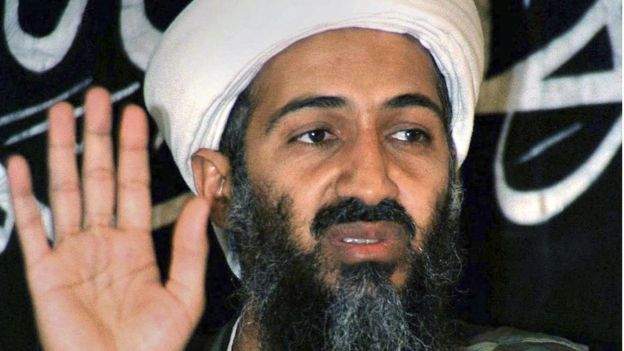George Floyd death: Al-Qaeda tries to exploit US unrest

Al-Qaeda is actively trying to exploit the current unrest in the US by reaching out to both Muslims and non-Muslims to present themselves as "champions of the oppressed".
The latest issue of the jihadist group's online magazine One Ummah uses the iconic image of George Floyd's last moments and a painting by the graffiti artist Banksy to help deliver its message of unsolicited support to protesters on US streets.
The English-language issue, clearly aimed at a domestic US audience, predicts the imminent demise of the US and its political system as well its economy and society.
"Armed protests rage across America and a civil war appears to be in the offing," reads its commentary. One of its messages is that, "not even the Democrats can help you but we can".
Mina Al-Lami from BBC Monitoring says there is a contrast between the approaches of al-Qaeda and its main rival, the Islamic State group (IS). Whereas IS has simply been gloating at America's discomfort and predicting that the unrest will spread to other countries, al-Qaeda has been more subtle, reaching out and trying to convert Americans to its version of Islam and its cause, she says.
The magazine piece, our analyst suggests, has clearly been written by someone who has a good knowledge of what is going on in the US.
Seeking to return
Al-Qaeda has largely been eclipsed in recent years by IS. But Dr Shiraz Maher, the Director of the International Centre for the Study of Radicalisation at King's College London, believes it is proactively trying to show it still has relevance on the world stage.
"It [the Black Lives Matter protests] is a huge current event... which is having a cascading effect across the globe and beyond the media and political sphere into the cultural and artistic realm," Dr Maher says. "So al-Qaeda is seeking to move into that space and trying to say, 'look here we are'."
"Armed protests rage across America and a civil war appears to be in the offing," reads its commentary. One of its messages is that, "not even the Democrats can help you but we can".
Mina Al-Lami from BBC Monitoring says there is a contrast between the approaches of al-Qaeda and its main rival, the Islamic State group (IS). Whereas IS has simply been gloating at America's discomfort and predicting that the unrest will spread to other countries, al-Qaeda has been more subtle, reaching out and trying to convert Americans to its version of Islam and its cause, she says.
The magazine piece, our analyst suggests, has clearly been written by someone who has a good knowledge of what is going on in the US.
Seeking to return
Al-Qaeda has largely been eclipsed in recent years by IS. But Dr Shiraz Maher, the Director of the International Centre for the Study of Radicalisation at King's College London, believes it is proactively trying to show it still has relevance on the world stage.
"It [the Black Lives Matter protests] is a huge current event... which is having a cascading effect across the globe and beyond the media and political sphere into the cultural and artistic realm," Dr Maher says. "So al-Qaeda is seeking to move into that space and trying to say, 'look here we are'."
There is a profound irony that a group with one of the most oppressive and bloodthirsty ideologies in the Middle East should now be presenting itself to angry Americans as champions of their cause against police brutality and systemic racism.
Al-Qaeda, which under the leadership of the late Osama Bin Laden, carried out the worst-ever terrorist attack in US history in September 2001, imposed a rule of such intolerance when it held sway in Iraq's Falluja province that it cut men's fingers off if it caught them smoking cigarettes.
It has since spawned violent offshoots all over the world, including IS.
Yet, despite occasional and isolated attack, such as the one by an al-Qaeda-inspired Saudi at Pensacola, Florida, in December 2019, both groups have until now largely failed to build significant support in the US population. This is in marked contrast to Europe whose cities have produced numerous hotbeds of jihadist sympathisers from the 1990s onwards.
For months Western intelligence chiefs have been warning that al-Qaeda has not gone away, it has simply been waiting for the right opportunities.
Already this year both al-Qaeda and IS have trumpeted the way Covid-19 has afflicted the US and the UK particularly badly, saying this is just retribution for these two countries' actions in the Middle East. Yet Iran currently has over 175,000 people infected and Egypt is now reportedly experiencing around 2,000 new infections daily.
Challenge for Western intelligence
Today the fugitive jihadist group is trying to make common cause with those in the US protesting against police brutality and racial discrimination, but urging them towards violent action.
Certainly their intervention, if it is noticed, is likely to be most unwelcome for protesters.
Al-Qaeda is a proscribed terrorist organisation that killed nearly 3,000 Americans in the 11 September attacks and has vowed to keep targeting Americans.
So how worried should US counter-terrorism officials be? Dr Shiraz Maher, who has spent the last 20 years studying the group and its ideology, believes this is all about exploiting opportunities.
"The nature of this type of propaganda is that it's always trying to cast the fishing net out there. They just need to hook in one person to say 'look how successful our campaign was'," Dr Maher says.
"And that's the great difficulty Western intelligence and law enforcement face when trying to mitigate this type of threat."
Photo: Reuters - Al-Qaeda under Bin Laden is responsible for the 9/11 attacks - the worst atrocity on US soil











